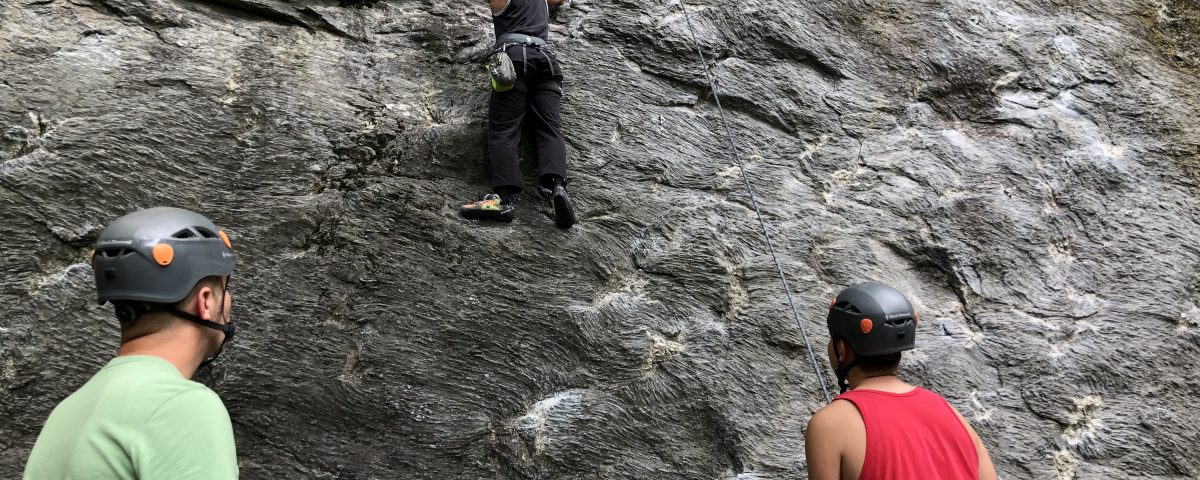Humanities Teacher Chris Dolan Explains the Value of Adventure-Based Learning
Humanities Teacher Chris Dolan Explains the Value of Adventure-Based Learning








Humanities teacher Chris Dolan combines her outdoor leadership experience and literature expertise to create unique, immersive classes.
Nestled in New Hampshire’s White Mountains, Oli is fortunate to be within an hour’s drive from a plethora of adventures, including fly fishing, mountain biking, hiking, whitewater rafting, and more. This summer, Oliverian’s newest humanities teacher, Chris Dolan, is taking advantage of our idyllic setting to get her students learning and growing outdoors.
Chris joins Oliverian after almost two decades of teaching teenagers at independent schools, and after recently serving as Director of Outdoor Education at Moravian Academy. While she calls herself a humanities teacher first, she has raft guide and wilderness first responder training, plus experience as an EMT. She is well-prepared to lead excursions into nature, where students can engage in the unique, adventure-based form of the learning that plays such a key role in Oliverian’s curriculum.
Outdoor Adventures at Oliverian
Chris arrived at Oliverian in June already eager to get her students outdoors. For the summer session, she taught Environmental History, Adventure in Literature, and an Outdoor Adventure class, which all have an outdoor emphasis. The Adventure in Literature class, for instance, offers both English credits and a way to get students exploring skills outside.
For that class, along with reading Into the Wild by Jon Krakauer, Chris keeps the students active: “We went hiking, we learned to fly fish, and we’re going to work with knots and outdoor medicine — anything that can relate to the book to give a more empathetic understanding of the character.” She sees value in combining the humanities with this kind of hands-on approach, explaining that “it’s a way of understanding things you’re reading about, a way to make a literature course more enjoyable — and to take advantage of the amazing outdoor setting we have here.”
With Chris, students have enjoyed a range of adventures this summer, including gold panning, hiking, fly fishing, mountain biking, kayaking, and even paintball. But she is adamant that an adventure doesn’t have to mean a multi-day trip with lots of gear — it can be as simple as figuring out how to jump off a rope swing. Simply spending time in the “outdoor paradise” nearby has benefits. Chris wants her students to realize that outdoor adventures can be woven into everyday life, especially because most Oliverian students come from outside the region and may not know much about the local ecosystem or history.
As Chris sees it, outdoor activity is beneficial in part because it is an organic learning experience. She doesn’t need to create the same kinds of lessons plans and objectives. Instead, she says, “we learn teamwork, develop a sense of community and respect for each other, and cultivate our curiosity about the world by simply being a group of people who are going to go out and do something really fun together.”
Indeed, lessons learned in these classes can go beyond those of a typical classroom. Part of the value of outdoor education is the fact that the students naturally end up disconnecting from technology. That has implications for the learning process, as students tend to dig deeper when faced with an outdoor challenge, rather than turn away. “You can’t distract yourself immediately,” notes Chris. “If you don’t catch some fish for a while, you don’t just get on your phone. It encourages focus that jibes perfectly with the idea of growth mindset.”
Adventures and the Growth Mindset
All too often, students are primed to believe that intelligence is fixed and that they have little control over their learning abilities. But outdoor adventure can support a different mindset — the belief that it’s possible to grow and change if you put in the effort. This “growth mindset” concept, which originates with Stanford psychologist Carol Dweck, recognizes that students aren’t inherently “smart” or “not smart” — intellectual ability really can increase with practice.
With outdoor education, that sense of growth is built into the curriculum, as the activities naturally promote building leadership, overcoming fear, trying new things, and the process of failing and trying again. “It’s coming less from the teacher,” says Chris. “It’s giving students more input and ownership over the experience.” She has seen it happen: “If you can provide that spark of fun that’s out there, that they can tap into, then it leads to this sort of internal desire to work on the skills to get there.”
It’s easy to be intimidated by the outdoors, but Chris encourages students of all skill levels to engage: “I’m a big proponent of the fact that beyond a certain level of confidence, you don’t have to be an expert to get a lot out of it.” She’s had students tell her that they appreciate the chance to be athletic and active without competition or evaluation. As Chris notes, “It’s very easy to take a group of kids out mountain biking and have them all at really different levels, facing challenges, working together at whatever level they’re at.”
Wilderness adventure has something for everyone. A student who may struggle with reading and writing could turn out to have a real talent for hands-on activity. But every student can discover new skills or foster new interests that could lead to a newfound sense of confidence. For instance, Chris is planning a wilderness medicine session where students will get hands-on experience with safety and risk management. That requires maturity and focus from the students — but she is certain they will step up to the task. “A sense of competence in any area translates out,” says Chris. “You realize you can do all kinds of things.”
